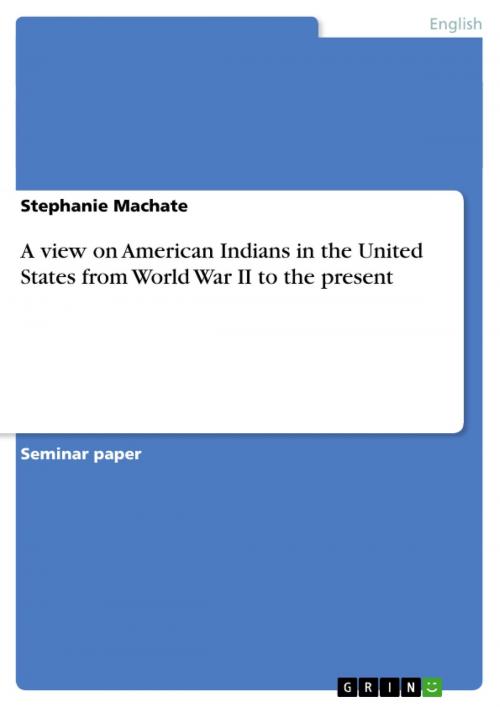A view on American Indians in the United States from World War II to the present
Nonfiction, Entertainment, Drama, Anthologies| Author: | Stephanie Machate | ISBN: | 9783638813235 |
| Publisher: | GRIN Publishing | Publication: | June 16, 2007 |
| Imprint: | GRIN Publishing | Language: | English |
| Author: | Stephanie Machate |
| ISBN: | 9783638813235 |
| Publisher: | GRIN Publishing |
| Publication: | June 16, 2007 |
| Imprint: | GRIN Publishing |
| Language: | English |
Seminar paper from the year 2005 in the subject American Studies - Culture and Applied Geography, grade: 2,0, Dresden Technical University, 10 entries in the bibliography, language: English, abstract: . Introduction The United States of America is a country whose history has been shaped by immigration. Nevertheless, one should not forget that the native people of America, including Eskimos, Aleuts and American Indians) contributed to what is now known as the United States. Interestingly, American Indians have been treated in history often like one of the other minority and immigrant groups. It is, however, obvious that American Indians have a special status within the United States because they are the indigenous people of the continent and in contrast to other ethnic minority groups they experienced the European settlement in the 'New World' right from the beginning. This paper will deal with the history of American Indians from 1941 to the present. This is supposed to be a rather contemporary view on American Indians in the U.S. society, since there have been a large number of studies concerning the American Indian past. The year 1941 marked an important date for the whole globe: It was the beginning of World War II, which changed the worldwide status quo. Due to this war, the Unites States became the world's most powerful nation in terms of military, economy, and policy. This development has had of course an impact on the U.S. society with its entire people - the white European population, the Afro-American population, the Asian population, etc. During this process, the United States became the modern society we all know now, and for this reason the situation changed for minority groups, too In this paper, the focus will be on the status of American Indians in the U.S. society and their ethnic identity, but it will also be questioned if and how American Indians show their ties to the United States as their mother country.
Seminar paper from the year 2005 in the subject American Studies - Culture and Applied Geography, grade: 2,0, Dresden Technical University, 10 entries in the bibliography, language: English, abstract: . Introduction The United States of America is a country whose history has been shaped by immigration. Nevertheless, one should not forget that the native people of America, including Eskimos, Aleuts and American Indians) contributed to what is now known as the United States. Interestingly, American Indians have been treated in history often like one of the other minority and immigrant groups. It is, however, obvious that American Indians have a special status within the United States because they are the indigenous people of the continent and in contrast to other ethnic minority groups they experienced the European settlement in the 'New World' right from the beginning. This paper will deal with the history of American Indians from 1941 to the present. This is supposed to be a rather contemporary view on American Indians in the U.S. society, since there have been a large number of studies concerning the American Indian past. The year 1941 marked an important date for the whole globe: It was the beginning of World War II, which changed the worldwide status quo. Due to this war, the Unites States became the world's most powerful nation in terms of military, economy, and policy. This development has had of course an impact on the U.S. society with its entire people - the white European population, the Afro-American population, the Asian population, etc. During this process, the United States became the modern society we all know now, and for this reason the situation changed for minority groups, too In this paper, the focus will be on the status of American Indians in the U.S. society and their ethnic identity, but it will also be questioned if and how American Indians show their ties to the United States as their mother country.















